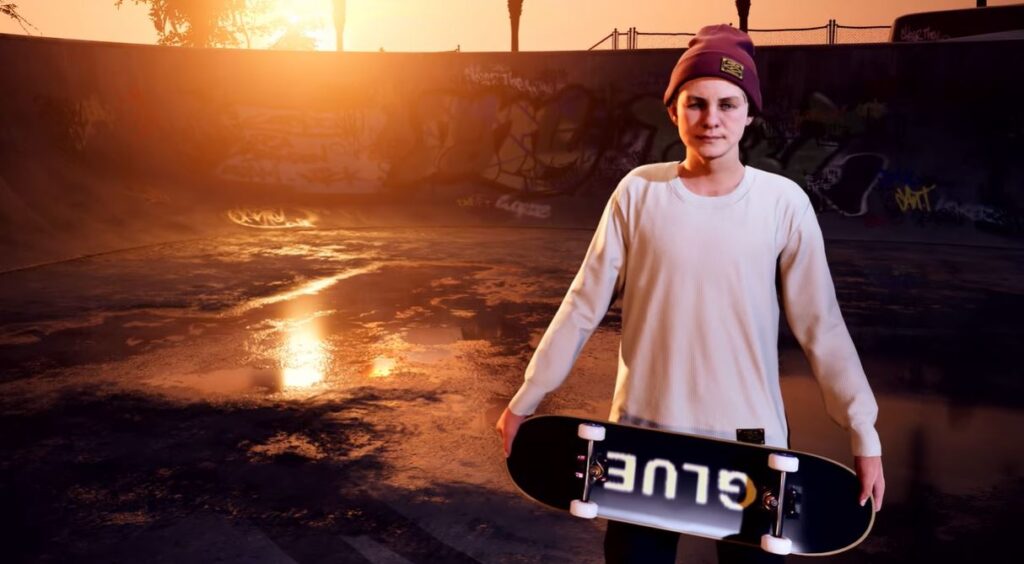
Here’s Why It Was Important To Include Leo Baker in Tony Hawk’s Pro Skater
2020 has been a big year for transgender representation in video games. We’ve seen the brilliant trans-centric indie game If Found…, had major screen time devoted to a trans character in one of this year’s biggest releases through Lev in The Last Of Us 2, and been given the first trans lead in a major studio game with Tyler Ronan in DontNod’s AA narrative adventure Tell Me Why. Both characters are likely to be talked about for a long time, folded into gaming’s ever-expanding queer canon as watershed moments and benchmarks. The inclusion of Leo Baker in the Tony Hawk’s Pro Skater 1 + 2 Remake will likely be forgotten, but given the wider context, Baker’s presence is arguably the most important.
Lev, for example, is very clearly the next step in a journey which includes the likes of Mass Effect, Dragon Age, and Horizon Zero Dawn, all of which include trans characters, relegating them to background roles and often being flawed in their presentation. Lev is flawed, certainly, but few could argue he’s relegated to a minor role. We could debate Lev’s importance all day, but the fact is that whether it was The Last Of Us or a different game, extra exposure was always coming. Trans characters have grown in prominence in video games recently, and it stands to reason that said growth would continue until one of them got a role the size of Lev’s in a game the size of The Last Of Us. Ditto Tyler, as crucial as he seems; had Tell Me Why launched with cis protagonists, eventually a major studio would have had a trans lead. This isn’t a knock on Naughty Dog or DontNod, though, they deserve credit for being the change they wish to see.
But Leo Baker is a one off. They’re a real-life pro skater, and a huge queer inspiration on the scene as an openly non-binary pro. This makes them the first non-binary playable character in a mainstream sports game. Given the toxicity of the debates around trans people in sport (summarised well here by the ACLU), Baker’s presence is genuinely groundbreaking. If THPS hadn’t done it, I don’t think any other major sports game ever would have. Baker is a crucial part of 2020’s gaming transness, and deserves to be celebrated with the fervour of If Found…, Tyler, and Lev.
Baker is far from a token inclusion. They’re one of the best skaters in the world, currently ranked 5th in the Street category, and is part of the new wave of superstars included in the remake, alongside the likes of Lizzie Armanto, Leticia Bufoni, and Nyjah Huston. They’re there on merit, and just by their presence, are one of 2020’s most important characters in gaming. The game does not mention Baker’s gender identity, instead just refers to them by their preferred name Leo and leaves it at that. Skaters are not categorised by gender, and so players unaware of Baker’s gender identity would likely not assume Baker was non-binary, and it could be argued then that the impact is lost. There is something to be said for bold and unapologetic representation, but to do so here would only ‘other’ Baker; the game never pauses to let us know that Tony Hawk, Bob Burnquist, or Tyshawn Jones are cisgender, so why should they single out Baker?
There is a balance to be struck, but like Baker grinding the pool at Burnside, the game finds its balance perfectly. The Pro Skater games have always been light on story, but as many ‘90s kids with scarred knees from skateboard practise can attest to, they’ve always pushed people towards skate culture as a whole. People who play this game with no real knowledge of skateboarding instantly become invested with the big tricks and huge combos, and start hunting out real life highlight reels. I know because I did just that. This time around, a generation of queer people will discover that the skater they’ve invested hours into is non-binary. That Baker is just like them, and that they belong. It’s a wonderful experience THPS has given people, and while that experience could have been stretched wider by highlighting Baker’s non-binaryness in the game, by leaving it to self discovery, they’ve offered a deeper experience instead.
This is particularly important because THPS is a sports game, and transphobia has been able to sink its bloody talons into sport with a success virtually unheard of elsewhere. When I was at school I played three different sports for four different clubs six nights a week. Now, I have not played sport nor gone to the gym in over two years; coinciding with my transition. I can work out at home, but I have resigned myself to the fact that I will probably never play football, the sport nearest to my heart, ever again. I’ve been subbed off before halftime, stretchered off with dysphoria while transphobia stops play.
My story is not particularly original; there are thousands of trans women like me, ejected from sport at even the most casual level because of the transphobia rampant throughout sports. At the highest level, it’s true trans athletes pose a unique conundrum, one I can’t profess to have all the answers to. But then, given research into the issue is ongoing and inconclusive, neither can my opponents. While we may need to ask serious questions at an Olympic level (although trans athletes have been eligible since 2004 and, to date, zero have competed), the debate has dripped down to grassroots level and essentially amounts to a ban on trans people at many sports clubs. Transphobes will get called out if they say ‘trans women are men’, but if they say ‘trans women on a football pitch are men’, no one bats an eye.
While trans people gain inches of visibility and acceptance in other walks of life, sport has refused to budge. That’s why Baker’s presence, as the first non-binary person (or trans person of any description) in a major sporting video game ever, is so incredibly valuable.
Zooming in on skating in particular, while we all remember the original games as classics, the humour of the likes of THUG and THAW are a little outdated these days, with ‘00s era skating indelibly linked to the nihilistic, Jackass-loving, dudebro mentality. Not racist or homophobic itself, but certainly in the South Parkian ‘caring is lame’ ballpark. It was very clear who belonged in the culture back then, and who didn’t. These days, skate culture has reinvented itself as inclusively rebellious, taking all kinds and giving itself a shot in the arm as it elevates the likes of Leo Baker to the peak of the sport.
We don’t see much of Baker’s personality in the game. Baker wears their queerness on their sleeves, and is famed for being unapologetic, outspoken, hard working, and infectiously witty. They recently starred in a Miley Cyrus video, and there’s definite similarities between Cyrus’ post-Disney brashness and Baker’s charismatic straight talking nature. By the nature of THPS, there’s no real room for personality; aside from a few lines after big airs or big spills, we hear nothing from the in-game characters at all. Held up against Lev, Tyler, and the various If Found… characters, Baker is far from the best written trans character in a video game this year. However, just by their presence in the game, providing non-binary representation to gaming (itself a rarity) and bringing trans representation to a genre so lacking in any queer voices whatsoever, Baker’s appearance in THPS is one of trans gaming’s most important moments of the year.






